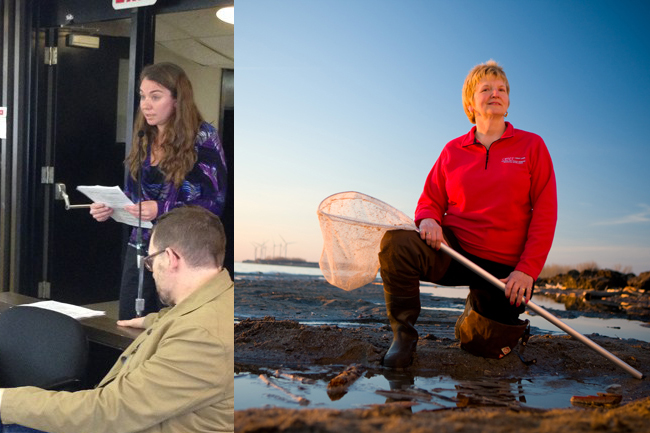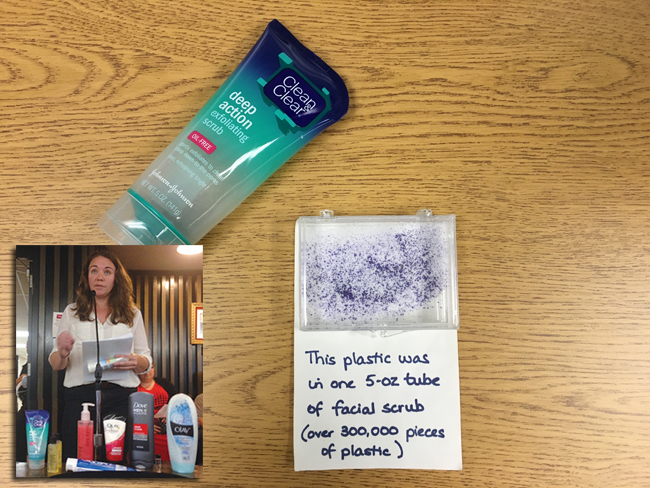 Dr. Sherri “Sam” Mason (left) and Helen Domske (right)
Dr. Sherri “Sam” Mason (left) and Helen Domske (right)
This audio clip is from a discussion on WRFA radio. If you don't see the player above, it's because you're using a non-Flash device (eg, iPhone or iPad). You can download the mp3 file by clicking here (mp3). It may take a few minutes to download, so please be patient.
Buffalo, NY, March 22, 2018 - WRFA public affairs director Jason Sample talks with New York Sea Grant's Coastal Education Specialist and Associate Director of the Great Lakes Program at the University at Buffalo Helen Domske and Fredonia State's Dr. Sherri “Sam” Mason.
Both Dr. Mason and Demske will deliver “Water Politics: Saving the Great Lakes, the Largest Fresh Water Ecosystem on the Planet,” a presentation on the health of the Great Lakes. The discussion, part of the GreenUp Jamestown Initiative at St. Luke’s Episcopal Church in Jamestown, NY, is slated to begin at 7 pm on Wednesday, March 28, 2018.
Going from regional to local in scope, the evening will start with Sam presenting on a recent State of the Great Lakes report. Helen will then present an overview of NY Sea Grant and the numerous projects they have supported. Sam, a current recipient of NY Sea Grant support, will close out by discussing her work, past and present. The panel will end with an open discussion with the audience.
 Fredonia State professor and researcher Dr. Sherri Mason (inset photo) speaking to the Chautauqua County Legislature prior to its vote on a local law banning microbeads in September 2015. Photos courtesy of Paul C. Focazio/NYSG; WRFA Radio (inset).
Fredonia State professor and researcher Dr. Sherri Mason (inset photo) speaking to the Chautauqua County Legislature prior to its vote on a local law banning microbeads in September 2015. Photos courtesy of Paul C. Focazio/NYSG; WRFA Radio (inset).
One recent NYSG-funded project, which began funding for in early 2016,
has a research team led by Mason determining degradation rates within
three different freshwater environments (shoreline, open-water, and
estuary) utilizing laboratory-scale environmental chambers and focusing
upon those plastics found to be most prominent in Great Lakes Plastic
Pollution open-water surveys. The research team is assessing ecosystem
impacts by conducting in-lab feeding studies using zooplankton and algae
to determine growth and survival rates of microorganisms both with and
without microplastics incorporated into feed. Project results will fill a
gap in scientific knowledge about the impacts of microplastics within
freshwater habitats.
NYSG has funded Mason on projects related to marine debris and microplastics. For more on the topic, see
www.nyseagrant.org/microplastics.
More Info: New York Sea Grant
New York Sea Grant (NYSG), a cooperative program of Cornell University
and the State University of New York (SUNY), is one of 33 university-based
programs under the National Oceanic and Atmospheric Administration’s
National Sea Grant College Program.
Since 1971, NYSG has represented a statewide network of integrated
research, education and extension services promoting coastal community
economic vitality, environmental sustainability and citizen awareness
and understanding about the State’s marine and Great Lakes resources.
Through NYSG’s efforts, the combined talents of university scientists
and extension specialists help develop and transfer science-based
information to many coastal user groups—businesses and industries,
federal, state and local government decision-makers and agency managers,
educators, the media and the interested public.
The program maintains Great Lakes offices at Cornell University, SUNY
Buffalo, SUNY Oswego and the Wayne County Cooperative Extension office
in Newark. In the State's marine waters, NYSG has offices at Stony Brook
University in Long Island, Brooklyn College and Cornell Cooperative
Extension in NYC and Kingston in the Hudson Valley.
For updates on Sea Grant activities:
www.nyseagrant.org has RSS,
Facebook,
Twitter, and
YouTube links. NYSG produces a monthly e-newsletter, "
NOAA Sea Grant's Social Media Review," via its blog,
www.nyseagrant.org/blog. Our program also offers a free e-list sign up via
www.nyseagrant.org/nycoastlines for its flagship publication, NY Coastlines/Currents, which is published quarterly.